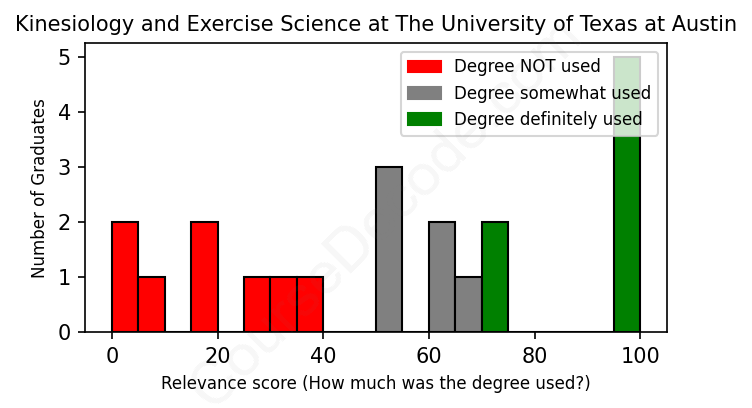
First, some facts. Of the Kinesiology and Exercise Science graduates from The University of Texas at Austin we've analyzed , here's how many have used (or NOT used) their degree in their career:

These are estimates based on AI analysis of 21 LinkedIn profiles (see below).
The verdict? Significantly below average. Overall, with an average relevance score of 53%, Kinesiology and Exercise Science graduates from The University of Texas at Austin have a much lower likelihood (-14%) of finding work in this field compared to the average graduate across all fields:
And for comparison, here's the chart for all profiles we've looked at across all degrees.
Also, after graduating, 57% of these graduates have pursued further education other than another Bachelor's degree (such as a Masters degree or other), compared to the average across all profiles of 35%. This suggests you may need more than just a Bachelors degree to be competitive as a Kinesiology and Exercise Science graduate.
See the details:
|
Relevance score: 0% We think this person has NOT gone into a career related to their degree. We think this person has NOT gone into a career related to their degree.
DEGREE INFOGraduated in 2023 from The University of Texas at Austin with a Bachelor of Science - BS in Kinesiology and Exercise Science. Also pursued further education since (see below). JOB HISTORY SINCE GRADUATIONSales Associate Madewell Jan 2023 - Aug 2023 FURTHER DEGREES DONE SINCE GRADUATINGDoctor of Physical TherapyThe University of Texas Medical Branch 2023 - 2026 ABOUTNo information provided. |
The top 10 most common jobs done by the graduates we've analyzed (ranked most common to least) are:
When looking at the career paths of graduates with a degree in Kinesiology and Exercise Science from The University of Texas at Austin, it's clear that many find themselves in jobs that strongly relate to their studies, especially in areas like physical therapy, coaching, and athletic performance. Positions such as Physical Therapist, Board Certified Behavior Analyst, and various coaching roles show a strong application of specialized knowledge from their degree in real-world settings where they help others improve their physical health, rehabilitate from injuries, or enhance athletic performance. These jobs typically require a solid understanding of human movement, exercise principles, and mental health strategies, aligning well with what these students learned during their time in college.
However, it's also noticeable that some graduates have ventured into roles that are less directly relevant to Kinesiology and Exercise Science. Jobs such as sales representatives, marketing positions, and administrative roles don’t usually tap into the specialized skills or knowledge from their degree. While these positions may offer some transferable skills and insights into customer behavior, they generally focus more on sales strategies or business management, which isn't what most Kinesiology majors are prepared for. Overall, while a good number of graduates find fulfilling roles closely tied to their field, there's a significant number that ends up in unrelated jobs, highlighting a mixed landscape for Kinesiology and Exercise Science graduates in the job market.
Here is a visual representation of the most common words in job titles for Kinesiology and Exercise Science graduates (this is across all Kinesiology and Exercise Science graduates we've analyzed, not just those who went to The University of Texas at Austin):

Graduates of Kinesiology and Exercise Science from The University of Texas at Austin seem to have a pretty diverse range of career paths. For many, their first jobs often align with their degree, landing roles related to physical therapy, coaching, training, or working in a health-related field. Jobs like working as a physical therapy tech, coaching basketball, or taking on roles in behavioral health services are common stepping stones right after graduation. However, it's worth noting that not all graduates stick strictly to kinesiology-related positions; some pivot into sales, marketing, or entirely different fields that may take them away from the traditional sports and science applications of their degree.
If you look at the trajectories about five to ten years down the road, there’s a mix of success stories and those who have wandered off into less relevant careers. Some have climbed the ranks in their chosen fields, with several establishing themselves as physical therapists, behavior analysts, or managers in sports facilities. On the flip side, a noticeable number have shifted away from kinesiology, settling into roles in real estate, corporate sales, or even marketing, which might not fully utilize the specialized knowledge they gained during their studies. So, while many graduates do find fulfilling careers related to their major, there are also those who may find themselves in jobs that are quite far removed from Kinesiology and Exercise Science down the line.
Honestly, a Bachelor’s degree in Kinesiology and Exercise Science at The University of Texas at Austin can be a solid mix of challenging and manageable, depending on how you approach it. You’ll dive into a lot of cool stuff about the human body, exercise techniques, and health, which can be really interesting if you’re into that kind of thing. The coursework can be demanding, especially the science classes like anatomy and physiology, but it's not typically considered super tough compared to some other majors in the STEM fields. If you stay organized, put in the effort, and maybe get involved in study groups, you'll likely find it to be a rewarding experience rather than an overwhelmingly hard one. So, if you’re passionate about fitness and health, it could be a really fun path!
Most commonly, in the LinkedIn profiles we've looked at, it takes people 4 years to finish a Bachelor degree in Kinesiology and Exercise Science.
Looking at the job paths of these Kinesiology and Exercise Science grads from UT Austin, it seems like there's a mix when it comes to money prospects. Some of the earlier graduates, especially those moving into behavior analysis and physical therapy, often land roles that can bring in decent salaries as they gain experience—like the BCBA roles and clinical director positions, which definitely pay well. However, others took positions that might not be as financially rewarding initially, like coaching or entry-level administrative roles, so it’s more of a slow burn for them. More recent grads are landing internships and entry-level roles, which typically don’t pay much, but those in specialized fields like sports science or clinical research seem to have a good shot at higher pay down the line. Overall, some are making great money while others are still working their way up, so it really depends on the specific path each person takes!
Here is a visual representation of the most common words seen in the "about" section of LinkedIn profiles who have a Bachelor degree in Kinesiology and Exercise Science (this is across all Kinesiology and Exercise Science graduates we've analyzed, not just those who went to The University of Texas at Austin). This may or may not be useful:

Here are all colleges offering a Bachelor degree in Kinesiology and Exercise Science (ordered by the average relevance score of their Kinesiology and Exercise Science graduates, best to worst) where we have analyzed at least 10 of their graduates: